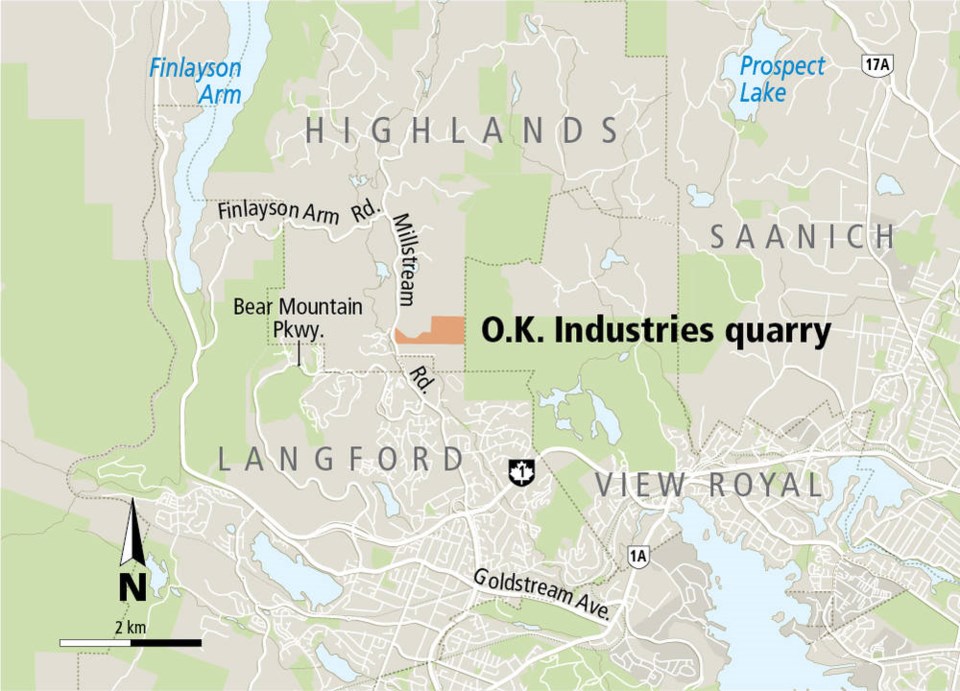The Highlands District Community Association wants to take its fight to stop development of a quarry along Millstream Road to the highest court in the land.
The association, which has vowed to leave no stone unturned in its fight against the quarry proposed by OK Industries, has petitioned the Supreme Court of Canada to hear its case to determine if provincial officials should have to consider climate change before issuing mining permits.
In June, the B.C. Appeals Court dismissed the association’s final attempt in B.C. to stop the quarry, though in her ruling, Justice Barbara Fisher said the legislation governing mine applications does not require a mines inspector to take into account climate change when making decisions.
Scott Richardson, chairman of the association, said that may open the door to a bigger fight: rethinking the legislation around mine permits.
“Part of the goal is still to overturn the provincial decision [on the quarry], because in our view, that decision was made without considering climate change and should have,” he said.
Richardson said the broader fight, which could have sweeping repercussions for any potential mine application, is to tackle what he calls antiquated mining legislation that doesn’t take into account things like First Nations’ interests and climate change.
The Appeals Court ruling noted the province’s statutory decision maker for mining — the provincial officer that approves mining permits based on submitted evidence — did consider climate change, but deemed it not relevant to the application, as the legislation did not require it.
According to the province’s Energy and Mines Ministry, it is up to the statutory decision maker to determine what is reasonable to take into consideration on permit applications, and that can include climate change.
The province suggested the professionals preparing designs for mining proponents have an obligation to consider climate change where appropriate.
The ministry pointed out that sustainability guidelines prepared by the Engineers and Geoscientists B.C. say that when one of their members is reviewing a project’s full life-cycle costs, they must consider measures to mitigate climate change, including minimizing greenhouse-gas emissions, while balancing economic, social and environmental factors.
Richardson conceded that stopping the quarry and getting the Supreme Court of Canada to hear their case are long shots. But he has a glimmer of hope they may be able to make a bigger impact and force the province to consider climate change when handing out mining permits.
“Our Supreme Court of Canada case asks whether B.C.’s Mines Inspector can decide that climate change is irrelevant in assessing mining projects.,” he said. “The whole world is waking up to the fact that climate change is affecting all of us in disastrous ways, yet our governments haven’t acted to change legislation to curtail climate change in step with our common interests and international commitments to reduce greenhouse gases.”
The quarry is being developed by OK Industries, which bought a 64-acre property in 2015 for $4.2 million. The company initially applied to have it rezoned to accommodate commercial and light industrial activity from its green-belt designation.
When the District of Highlands rejected the proposal in 2016, OK applied to the province for a mines permit for a quarry. That permit was granted last year.
The approval triggered the community association’s application for a judicial review of the mines permit, which the courts denied, and then spurred the appeal.
The District of Highlands has also appealed to stop the quarry. The district appealed a ruling that local bylaws over OK Industries’ activities on the quarry site do not apply as the activities, which include tree falling, soil removal, blasting and building, fall under provincial jurisdiction under the Mines Act.
aduffy@timescolonist.com



